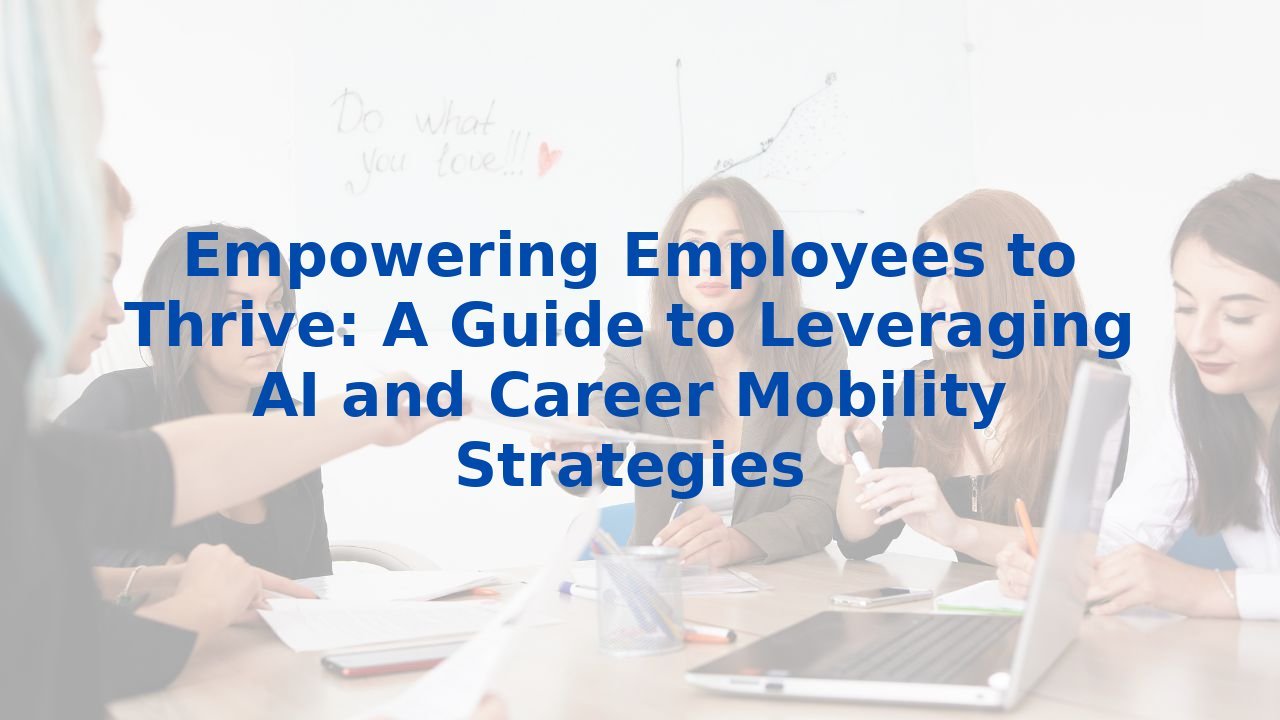Empowering Employees to Thrive: A Guide to Leveraging AI and Career Mobility Strategies
Empowering Employees to Thrive: A Guide to Leveraging AI and Career Mobility Strategies
In a world where adaptability is crucial, the marriage of Artificial Intelligence (AI) with career mobility strategies could redefine how organizations empower their employees. As businesses evolve, it's essential that their workforce evolves alongside them. Leveraging AI can enhance efficiency in key business processes and, when coupled with strategic training, unleash the true potential of your employees.
Understanding Business Processes
At the core of a thriving organization lies a network of interconnected business processes. From core operations—like production and customer service—to intermediary functions, such as IT management and project scheduling, these processes can become complicated and prone to inefficiencies. An organization's agility largely depends on how well these processes are understood and executed.
The Transformative Role of AI in Business Processes
AI acts as a catalyst for change within business processes. Its ability to automate repetitive tasks, analyze vast datasets, and offer predictive insights fundamentally redefines operational efficiency. Here’s how:
1. Process Discovery and Mapping
With techniques like process mining and natural language processing, AI efficiently maps existing processes, revealing bottlenecks that can hinder the effectiveness of your operations. This clarity allows organizations to streamline workflows, setting the stage for transformation.
2. Process Automation
Through automation of mundane tasks such as data entry and email responses, AI reduces the human error factor and liberates employees to focus on higher-value work. This shift not only enhances productivity but also reinvigorates employee engagement.
3. Predictive Analytics
AI allows organizations to leverage past data trends to predict future outcomes. Whether forecasting sales or managing inventory, these predictive capabilities help leaders make informed decisions that propel growth.
4. Risk Management
In an ever-volatile marketplace, AI enhances risk management efforts by pinpointing vulnerabilities and forecasting potential financial downturns. The ability to detect fraud or anticipate operational challenges ensures your organization remains resilient and secure.
5. Decision Support
AI doesn’t just crunch numbers; it offers simulations that illuminate alternative pathways. Decision-makers gain access to objective insights enabling them to strategize effectively, promoting a culture of data-driven decisions within the organization.
6. Customer Service Optimization
AI redefines customer service by accurately triaging requests and enhancing the customer journey. With intelligent chatbots handling preliminary inquiries, frontline employees can devote their time to complex customer needs, thus offering a more satisfying service experience.
The Benefits of AI Integration
The integration of AI into everyday processes yields immeasurable benefits, including:
- Improved Efficiency: By automating routine tasks, AI minimizes workload, allowing team members to allocate resources toward strategic initiatives.
- Enhanced Decision-Making: AI equips businesses with real-time insights for critical decision-making, fostering a culture of continuous improvement.
- Reduced Errors: Automation not only streamlines operations but also drastically reduces the likelihood of mistakes, ensuring processes are consistent.
- Cost Reduction: AI decreases dependency on manual labor and optimizes resource allocation, ultimately leading to substantial reductions in operational costs.
The Importance of Training Your Employees for AI
While AI serves as a potent ally in efficiency and productivity, its success hinges on well-trained employees. Embracing AI means empowering your workforce to harness its capabilities fully. Here’s why employee training is vital:
- Understanding AI Capabilities: Employees equipped with knowledge about AI can better leverage its potential within workflows.
- Adaptability: As AI technologies advance, fostering a culture of learning enables staff to remain adaptable and proficient in utilizing new tools.
- Informed Decision-Making: A well-rounded understanding of AI-driven insights ensures employees can effectively interpret data, making empowered decisions that align with organizational goals.
Conclusion
AI presents a transformative opportunity for organizations aiming to boost efficiency and employee potential. However, the true magic happens when AI is effectively integrated into business processes and employees are empowered through training. By doing so, organizations foster a resilient workforce capable of navigating the complexities of today’s dynamic landscape.
Invest in both AI capabilities and employee training to create a holistic strategy that ensures your business remains a frontrunner in an ever-evolving market. With this powerful combination, you can cultivate an environment where employees not only thrive but drive the organization toward a successful future.



